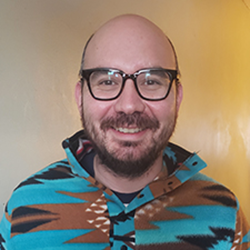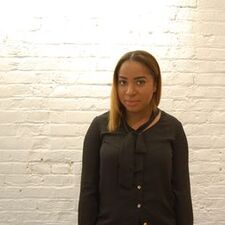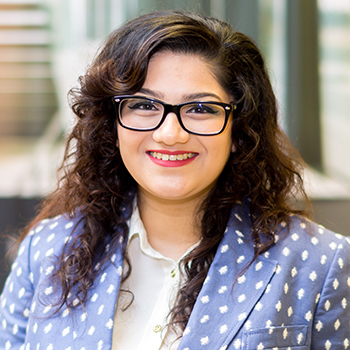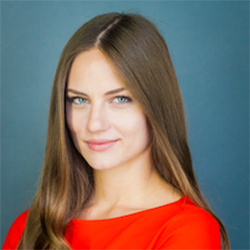Dave Smith

Professor, George Brown College
Social Work
Why did you decide to become a social worker and what led you to your current position(s)?
I am Plains Cree and a member of Beardy’s and Okemasis First Nations. Although my mom didn't attend residential schools, three generations of our family did attend these schools which has had many lasting effects. When I was in high school, I had a really negative experience and I barely passed. I didn't want anything to do with post-secondary education, so I ended up doing odd jobs in customer service and food service positions. Since most of my experience was working in cafes, bars, kitchens, and restaurants, switching to social work was a big career change. My mom worked within the social work field, specifically with women in transitional housing.
About 11 years ago, my mom passed away, which was very difficult because we were very close. Her passing away was one of those moments that motivated me to make a change and find a different career path. This led me to apply for the Social Service Worker program (SSW Program) at George Brown College. Alongside applying to this program, I also started volunteering within the field. In the end, I didn't get into the SSW program, because it's quite popular and they have a long waitlist. After meeting with an educational counselor at George Brown, they suggested that I apply for the Community Work program, which I did and was accepted! I was surprised how much I enjoyed school and now see education as a tool for individuals, especially from the First Nations, Innuit, and Metis communities, to address some of these cyclical and generational issues.
School became enjoyable so instead of finding a job right away, I transferred to York University’s Bachelors of Social Work program and became really interested in education and how it can align with community and social work practices. After taking a year off to work, I applied to the MSW program at York, and once competed, I started working in the field. Throughout my volunteer, professional, and placement experiences, I have devoted myself to gaining skills sets surrounding training and education and teaching others. Having said that, I also have experienced in clinical counselling and community development work. I think that in all these types of interactions, there is an opportunity to apply some of these theories and understandings and practices within it and education process.
What is your current position(s) and with what organizations or agency?
I work at George Brown College in the SSW program teaching three sections that prepares students for field placement. I also teach two sections of Indigenous Theories and Understandings in Social Work Practice York’s School of Social Work, and I'm also teaching with the Annishnawbe Health Toronto’s (AHT) Community Health Worker Program. I find that all three institutions are unique. I teach eight students per cohort, within the AHT program, and many of these folks haven’t finished high school or they are attending college for the first time. The program has a unique approach because the students have unique needs so I use different approaches to navigate tricky situations where a lot of issues can arise. Last year (2021), for example, with the discovery at the Kamloops residential school, I focused on trauma processing with the group. At the college level, I work alongside students to provide opportunities for them to further develop their skills in the field. The third institution I teach with is York’s BSW program.
I also volunteer with Aboriginal Legal Services Toronto Community Council program (ALSTCC), which is a restorative justice court diversion program. The ALSTCC program has members from the Indigenous community sit on a panel with people who are in the program. This is a learning experience for me and a way for me to give back to the community, make connections, and mainly to increase my awareness about restorative justice within the Indigenous community. Teaching will always be something I want to continue, but I also enjoy working at the community level, as a consultant to create trainings with community organizations about working alongside Indigenous communities and building positive relationships between the organization and larger community.
What do you enjoy about your current position, and what do you find challenging?
I love working as an educator because I enjoy teaching and facilitating. I enjoy making connections with students and community members and building good, positive, and healthy relationships because a lot of my work is focused on making connections, which is a key component in many community and social work approaches. One of the challenges is that I try to encourage people to succeed and do really well, and with that I have to chase people down to get things like assignments or if I'm supervising students who are in field work, I need to make sure that they are doing what they're supposed to be doing. It's quite similar to working in the field because there's a lot of frustration in terms of getting ahold of elusive individuals or supporting people who are going through really difficult challenges. I think that it's important to accommodating and welcoming because it helps to create an environment where people feel comfortable to reach their goals. Another challenge is dealing with the day-to-day tedious administrative tasks, which isn’t a lot of fun, it can be a bit numbing at times.
The Covid pandemic really changed how I connected with people because you never know what the people on the screen are going through, what type of environment they are in, they might be sharing internet with eight other people or they might be in an unsafe environment, and so it's really difficult to know what's actually happening on the other end. When there’s tech issues and people’s cameras or microphones aren’t working it can feel like you are talking into a void for a period of time, so it can be weird and super challenging. There really isn't one perfect work/education environment for everyone but one of the positive to being online is that people have the more opportunities to take part in programs, classes or whatever else. Online learning has provided different and unique opportunities for people to take part in many types of interactions, which is pretty cool.
What did you take away from the BSW & MSW program?
I think one of the biggest takeaways is the critical lens that the School of Social Work uses. There are some programs that focus more on clinical or bureaucratic processes, but I think many of those skills can be taught through placements and employment opportunities. I think the most important aspect of the program is its critical analysis because, unfortunately, not all folks in the field have this lens and so it puts York’s students at an advantage. My experience in the field, especially how I have focused on micro interactions, or clinical work, it can be very easy to lose sight of larger issues happening. I really try to encourage others to focus on how the critical approach connects to the micro, meso, and macro levels, being able to analyze situations how structural issues affect people on all of these levels. I think it's important to be able to understand the individual within a micro, meso, and macro level, especially when you are working with people from diverse backgrounds. Critical analysis also helps to inform critical self-reflexivity, which can sometimes get lost in practice. Learning from a critical lens can also be inclusive of a harm reduction approach which encourages the practitioner to look at the interactions they have with someone and how they can reduce harm in the future. It’s important for a social worker to have the ability to analyze, dissect, and take apart all these complex situations and influences that we come into contact with on a regular basis. If a practitioner doesn’t have this ability, it’s concerning because they can come from a very clinical, bureaucratic hierarchical approach which has and continues to cause harm to various communities. Unfortunately, a lot of different schools, programs, fields, and sectors aren’t critically analyzing the way they provide support, and there's a lot of catching up that needs to happen to provide wholistic support. I think that York’s School of Social Work does a very good job teaching from a critical lens. I've also met a lot of really fantastic staff and faculty at the school and if I hadn't met and come in contact with some of these folks, I don't know if I would have followed through with what I'm doing now.
Would you be able to share a career highlight?
I love seeing people reach their goals and being able to see their growth. I think the reason is because I've had experiences where I've been in a program and it felt like things were going nowhere, and there's no progress being made, and it can be very frustrating. What’s really cool is when you are doing a check-in and hear people say they got something out of the experience or lesson, it makes it worthwhile. I really enjoy seeing people actually reaching their goals, being able to have some sort of growth, and develop skills. I really enjoy building good relationships with folks and so, when there are those moments where someone has met their goal, it makes me happy and it sort of, you know, makes it worth all those frustrating banging my head against the wall type of moments.
What advice would you give to a recent grad or social work student?
A lot of the opportunities I’ve had, there's only been only a couple jobs where I've actually had to sit down and put together a resume and cover letter. A lot of the opportunities I have had, have come through either volunteer or placement positions or other work opportunities, so I it's always good to build strong relationships and to be mindful about when's a good time to speak up when maybe it might not be a good time to speak up if there are frustrating things. I've gotten a lot of great opportunities from people who just said there's this opportunity x,y,z happening here, maybe you should look into it and I'm very thankful for the opportunities I had, and I think it's also important because it’s tough getting into the field. I always encourage people to volunteer; I volunteer regularly, and I think it's a good way to help develop more skills and work towards more opportunities in the future.
What's the best career decision you've made?
The two best career decisions I've made would be building good relationships and being mindful about the things I say when I've been frustrated. Working in activism and social action is a really important area which can be quite charged at times where a variety of emotions can be felt about different situations. When I’m in these situations, I try to have a perspective of diplomacy, that goes hand in hand with this activism piece which can be very difficult balance to navigate. It’s important to balance those things to know when it's important and appropriate to speak up and provide feedback to address something, but at the same time knowing when to navigate these situations in a less assertive way similar to the ‘in-your-face activism’. When faces with these types of situations, I have my own approach and philosophy and I try and to analyze the situation to figure out a how to best react to the issue at hand. I've been very happy that I have been mindful when in challenging situations, so I try to reinforce that with some of the folks that I work with.
Browse more Alumni profiles
Business Economics, Economics
Bachelor of Arts (BA) - Honours
2000
President & CEO, ISM - a Kyndryl Company
Communication Studies
Bachelor of Arts (BA) - Honours
2013
Communications Manager, Wireless, Shaw Communications
Information Technology
Bachelor of Commerce (BCom)
2023
Machine Learning Engineer, SourcingHaus Research and Consulting Group




